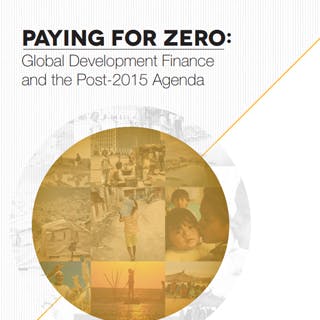Editor’s Note: This post originally appeared on John McArthur’s blog here.
A couple of quick updates relating to the post-2015 negotiations:
1) A cleaned up version of Paying for Zero: Global Development Finance and the Post-2015 agenda is now available.
2) More importantly: over the weekend the UN General Assembly’s Open Working Group (OWG) on Sustainable Development Goals issued its final outcome document. After a year and a half of arguably the most expansive global consultations ever conducted by an intergovernmental process, the last step was an intensive week-long conference at UN headquarters, culminating in a 29-hour marathon negotiating session from Friday through Saturday morning. The upshot is a list of 17 proposed goals (listed below) and 169 underlying targets to be implemented universally between 2016 and 2030. These provide something of a rough draft for global negotiations through to the UN’s major decision summit in September 2015.
Most analysts and advocates agree the agenda needs to be boiled down to a more focused number of goals and targets if it is to achieve long-term success in implementation. Some have suggested an analogue of “10 commandments” (or some such sentiment not affiliated with any religions) that can be easily remembered and communicated. Whatever the right number may be, two interwoven questions underpin any aim for focus. First, what are the common priorities that together provide enough grist for action across each of the key constituencies represented by 193 UN member states? Second, what are the practical mechanisms and institutional gaps to be addressed if goals and targets are to be achieved?
The answer to the second question affects the answer to the first. In the absence of any real practical initiatives or resources on the table, especially to support the ambitions of emerging middle-income countries who might feel they gain little from MDG-type initiatives, the likelihood shrinks for a more focused agenda.
There will be a few headline moments en route to September 2015.
- Before the end of the summer, the Intergovernmental Committee of Experts on Sustainable Development Financing is slated to present its report and recommendations.
- On 23 September 2014, Secretary-General Ban Ki-moon will convene a special climate summit in New York, convening leaders from government, business and civil society to stimulate renewed momentum on the practicalities of mitigation and adaptation well before the December 2015 deadline for intergovernmental climate negotiations (see proposed goal 13 below).
- By the end of 2014 (likely November), the Secretary-General will present his synthesis of all the key post-2015 inputs to date, and recommend a new baseline for the 2015 negotiations
- On 13-16 July 2015, an International Conference on Financing for Development will take place in Addis Ababa, Ethiopia. This aims to serve the post-2015 goals in a manner similar to how the landmark March 2002 Monterrey FfD conference provided the de facto launch of the Millennium Development Goals.
A variety of subject-specific major events will also take place among key constituencies, ranging from global health to education to ocean management.
The OWG’s final product marks a significant milestone in the post-2015 process. Whatever one’s views on the document itself, we now have a clear reference point for engaging broader conversations within and across all countries. With a bit of luck and a lot of hard work and collaboration, the post-2015 global development goals could still be the most salient and robust shared objectives the world has ever seen.
***
Open Working Group’s Proposed Sustainable Development Goals for 2030
1. End poverty in all its forms everywhere
2. End hunger, achieve food security and improved nutrition, and promote sustainable agriculture
3. Ensure healthy lives and promote well-being for all at all ages
4. Ensure inclusive and equitable quality education and promote life-long learning opportunities for all
5. Achieve gender equality and empower all women and girls
6. Ensure availability and sustainable management of water and sanitation for all
7. Ensure access to affordable, reliable, sustainable, and modern energy for all
8. Promote sustained, inclusive and sustainable economic growth, full and productive employment and decent work for all
9. Build resilient infrastructure, promote inclusive and sustainable industrialization and foster innovation
10. Reduce inequality within and among countries
11. Make cities and human settlements inclusive, safe, resilient and sustainable
12. Ensure sustainable consumption and production patterns
13. Take urgent action to combat climate change and its impacts *
*Acknowledging that the UNFCCC is the primary international, intergovernmental forum for negotiating the global response to climate change .
14. Conserve and sustainably use the oceans, seas and marine resources for sustainable development
15. Protect, restore and promote sustainable use of terrestrial ecosystems, sustainably manage forests, combat desertification, and halt and reverse land degradation and halt biodiversity loss
16. Promote peaceful and inclusive societies for sustainable development, provide access to justice for all and build effective, accountable and inclusive institutions at all levels
17. Strengthen the means of implementation and revitalize the global partnership for sustainable development

